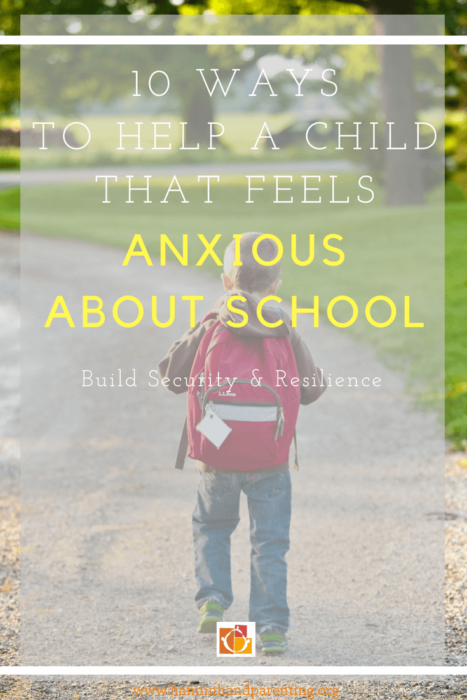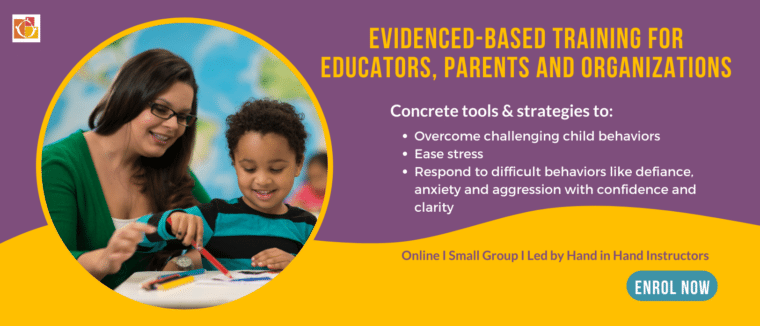
School can bring up a lot of change – and a lot of feelings about the change. For some children, school can feel a momentous challenge. They feel anxious and stressed – but you might never know it.
The thing is, often, kids don't tell you they are anxious about school – at least not in ways you might expect.
Instead, they show you.
Look for “Secret” Signs of Stress and Anxiety
If your child could walk up to you and say, “I’d like to talk about this school thing. I’m feeling a little uncertain about what to expect. I’m not sure I’m ready,” they sure would.
But even the most articulate children have trouble being so straightforward.
Instead, and in order to alert us to their nagging fears and their anxiousness, children try to show us in other ways.
Often annoying ways.
Or frustrating ways.
Or in ways that tug at our emotions too.
The Gottman Institute calls these signals “attention bids.”
Every child is different, but here’s what you might see if a child is anxious about a new term or teacher.
- Some children may become very clingy
- There may be more tears, more often, seemingly over nothing or from nowhere
- Levels of whining may suddenly rise
- You'll see aggressive behaviors including rage, kicking, hitting and biting
- Your child might get very demanding about how he or she wants things to be done. If you can never cut that piece of toast “just right,” you may be hot on the trail of your child’s nervousness and worry.
What Drives These Bids for Connection?
Kids bid for attention whenever they feel unsure about their place in their world.
When a new baby comes and threaten to steal all the love away, for instance.
Or when there is a looming concern, such as school.
And if you think about it, whining, clinginess and demanding behavior do get attention fast. They also give an outlet for the stress a child is carrying. A way to offload the anxiety. When kids can shed these anxious feelings they actually work through the fears ahead of school.
However, attention bids like this are not entirely effective when a parent reads them as button-pushing behavior and tries to shut them down.
How To Respond To A Child's Attention Bids Ahead of School
Once a child's anxious feelings have a place to bubble up, they lose their power. It works this way for adults too.
Imagine, you have an important call to make. You are tense and nervous. Yet no matter how many times you tell yourself you have to make that call, you can't seem to pick up the phone.
Imagine telling a friend about these fears. Tell them how silly it may sound, or explain exactly why you feel worried. How do you feel after that call?
You may not be jumping fences to get the call done, but the thought of it likely doesn't feel so unbearable or impossible. In fact, the more space and generosity you give yourself, the easier it gets. The shorter the distance becomes between you thinking about making the call, and actually picking up the phone, dialling, and saying “Hi.”
It's the same way with kids and their fears about school.
Getting close, listening to, and responding kindly to a child, even if what they are saying is nothing related to school will help.
This gives a child an outlet that helps drain a child's pent up anxiousness.
When you give them opportunities to express them, they work on their fears and move closer to feeling happier about school.
An effective way to do this is by setting a limit and holding it. Hand in Hand's three-step approach to setting limit is ideal because it provides a space for a child to bring their feelings, and fosters a warm and supportive response.
Learn about it here.
10 Ways to Help Children Who Feel Anxious About Starting School
You can also get very intentional about making space for your child to offload about school, in playful and supportive ways. These 10 ideas give you many ideas how.
1. Up The Sense of Security at Home
Around a week before school starts, get set to spend around 10 minutes a day with your attention solely on your child and what he or she wants to play. We call this Special Time at Hand in Hand and it works wonders for helping build security.
Find out more about how to do Special Time – and get a handy checklist here.
2. Play Around the Drama
Increase play. PLAY LOTS and let your child take the lead.
If they ask you to play gently, follow their direction. If they want to play hard, do your best to dive in!
Rough and tumble games, like pillow fights, burrito rolls, and tag work well to help clear built- up stress and tension through physical touch. You'll know its happening when your child laughs hard – or, wait for it, cries.
(If your child finds a small thing to cry over, they are actually using tears as an outlet to let go of some fear – more about that next!)
New to playing this way? We hear you! Get started with this free guide to our best five games to solve power struggles and increase co-operation.
3. Embrace Any Feelings Your Child Shows
Don't be surprised if a child appears to find reasons to cry during play.
When these tears spill it’s similar to when we have had a really tough day. Some lovely person says something kind. What happens? You find yourself crying!
That relief we feel knowing that we are still loved and the world is ok is the same for our children too!
Very often a child will use a small knock or heavy landing as a good excuse to have a good emotional clear out through cry.
In those times lean in and listen. You don't need to say much, just be there and say something occasionally, like, “I know it's hard,” or “You're safe here.”
Sometimes this will bring on more tears, again that's a good thing. Your child is taking this time to let those fears and worries go.
You can learn more about the science of why this listening strategy works in The Science Behind the Hand in Hand Parenting Tool of Staylistening
 4. Sneak in Extra Kisses and Surprise Snuggles.
4. Sneak in Extra Kisses and Surprise Snuggles.
Reframe time before school as an extra special time to be close to your child.
This strengthens their sense of confidence, connection, and self-worth.
As this article outlines, 80% of adults say they did not feel loved by their parents.
We can change that for our children.
When we look for opportunities to “catch” them being their adorable selves, and when we notice them and delight in their special traits.
So, when they are playing, sneak up and plant a surprise kiss on their soft cheek. Spend an extra five minutes in the day cuddled up with a book, or stay a few minutes longer with them after lights out.
These efforts fill a child’s cup and soothe their anxiousness.
5. Listen To Your Feelings Too
You may have to go through many rounds of Special Time, play, and listening to your child cry if you want to give your child all the good opportunities they need to offload fears and worries about starting school.
That can be emotionally and physically tiring for us parents.
Make sure you have someone to listen to you and your feelings about the situation. Think about joining our free Hand in Hand Network, where the parents and moderators do a great job offering community and support in the tough times.
6. Bring Up the Subject of School Often
Do keep mentioning school – you might even like to keep a calendar and check the days off until the first day – and find excuses to bring up the topic:
- Have fun picking out a few special things your children might need for school and then stop for ice-cream.
- Try out the route to school.
- Visit the school even if the school gates are still shut for the holidays.
- Have a playdate with school friends.
- Play “school,” and watch for your child's reactions. Are they happy to play, reluctant? Do they want to be a teacher or a pupil? How do they interact with you in your role during the game?
These actions not only bring about familiarity but also give lots of room for a child to express how he or she feels about school.
Remember, this may look like more crying, whining or lots of requests to play and be close, or it may come through defiant statements, like these:
- “I don’t want to go to school.”
- “I won’t go.”
- “School sucks and I hate it.”
- “I’m never going to go.”
- “I don' want to play school.”
7. Be A True Feelings Researcher
Despite the way it sounds to us, your child is doing good things by bringing these concerns up with the people he or she feels safest with – you!
Strong sentences like these display that a child has lots of feelings waiting to be heard.
Most of us were brought up to find solutions and try to offer fixes when we hear words like these. We might say:
- “Oh! It won’t be that bad.”
- “You’ll love it once you start.”
- “Oh, don't worry, you'll be fine.”
Since we heard these words as children, it's natural that we find ourselves saying similar things, but a child can feel that their big, scary, intense worries are being brushed under the carpet.
Change the cycle by being open to any communication.
Put yourself in the role of a researcher and seek the true feelings behind the statements. Here's three statements you can try instead.
- “Oh yes? You hate school? That must feel hard.”
- “I found school tough too. What do you dislike the most?”
- “I wonder why you feel that?” or “I wonder how we can get past that?”
Sometimes kids can be their own best solution-finders.
Your child might tell you. “It could be ok if you promise you’ll be there when I go.” Or “Maybe if I take my special pencil I’ll feel better.”
But if they don't have suggestions, don't rush or force them.
Keep close and keep wondering until your child breaks the mood. (Often this may be with something totally unexpected, like, “Let’s play cars!”)
 8. Respond Your Child’s Truth-Radar
8. Respond Your Child’s Truth-Radar
Kids have a well-attuned truth radar, and can sniff out any hints of avoidance, so it helps to be as honest as possible when they ask tough questions.
“Mom, will you stay in class with me all day?”
“Why does baby brother get to stay home with you?”
Understandably, sometimes we want to run as fast as we can from these big questions, fearful ourselves about bringing on upsets or perhaps making an already scary situation seem even scarier.
But this can be distracting for a child.
That truth radar senses something not quite right.
They may question your validity, or even the validity of their own feelings when you tell them something that avoids the truth.
What can you do instead? (Even when your heart is pounding!)
- Move in close.
- Make eye contact.
- Keep your tone light. “I will be there at drop-off and pick-up, but I can't stay in class all the time.” Or, “Yes, baby brother is too young to be in school. He’ll stay back until he’s your age, just like you have. What do you think about that?”
If this brings on cries of upset or defiance, you can move in close and acknowledge that this time is hard on your child. Your child is using this situation as an opportunity to shed some anxiousness.
They are so smart!
9. Build School-Time Habits Ahead of School Time
If school means earlier wake-up times, more hurrying and other changes in your routine you might like to practice them ahead of time.
Look for where there may be sticky points.
Does it take your child longer than you thought to change? Is breakfast going to be a challenge?
This is a chance before the school day rush kicks in for real to prepare, adjust and rework mornings to be more like you’d like them.
10. Make a Plan for Staying Connected on School Days
Establishing some personal ways to connect and keep connections high do a lot to help children feel more secure when they are away from you. Try:
- a little note in a lunchbox
- a keepsake treasure in a pocket
- a morning joke
- a special drop-off routine
Send Your Child To School Feeling Less Anxious and More Confident
Here's one last thing to remember.
These ideas work best when you use a variety. Some increase warmth and security, and encourage a child to show their true feelings, others are there to support and nurture a child as they offload their fears, so try experimenting with a few.
This process is leads to increased resilience and the confidence to go off to school peacefully.
Do you have a child who feels anxious about going to school?
What behaviors are you seeing? Have you found good solutions to supporting your child through the transition? We'd love to hear your thoughts and stories.
More Tools For Your Parenting Toolbox
Read 10 Signs Your Child is Stressed About School and find out how to help them.
Get help for separation anxiety at the school-gates and drop-off in How Staylistening at Drop-Off Can Relieve Separation Anxiety
Is your child in a bad mood after school? Read Affection Play—A Powerful Antidote to the After-School Blahs
Encourage your school to adopt a “long goodbye” approach to ease a child's separation anxiety. Click here to read about the pre-schoolers who use it.
Nurture self-regulation, resilience and cooperation
Learn five tools that will powerfully and positively impact how you parent in a Hand in Hand Foundations Class (formerly the Starter Class). Classes are enrolling now. Click here to learn more.
